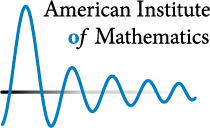
at the
American Institute of Mathematics, Palo Alto, California
organized by
Asher Auel, Brendan Hassett, Anthony V'arilly-Alvarado, and Bianca Viray
This workshop, sponsored by AIM and the NSF, will be devoted to studying elements of the Brauer group from both an arithmetic perspective and a Hodge-theoretic and derived categorical perspective.
Elements of the Brauer group arise in the theory of obstructions to the existence of rational points on varieties and to the existence of universal objects of moduli spaces of stable sheaves. The goal of this workshop is to bring together researchers in number theory, complex algebraic geometry, derived categories, and Hodge theory to study connections between these perspectives on Brauer group elements.
The main topics for the workshop are
The workshop will differ from typical conferences in some regards. Participants will be invited to suggest open problems and questions before the workshop begins, and these will be posted on the workshop website. These include specific problems on which there is hope of making some progress during the workshop, as well as more ambitious problems which may influence the future activity of the field. Lectures at the workshop will be focused on familiarizing the participants with the background material leading up to specific problems, and the schedule will include discussion and parallel working sessions.
The deadline to apply for support to participate in this workshop has passed.
For more information email workshops@aimath.org
Plain text announcement or brief announcement.
Go to the
American Institute of Mathematics.
Go to the
list of upcoming workshops.